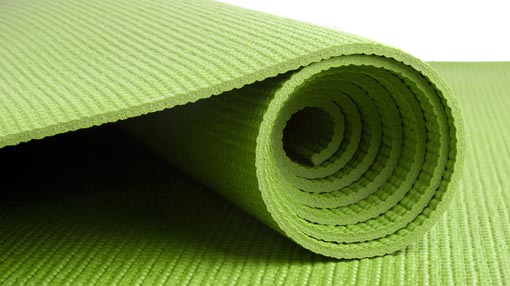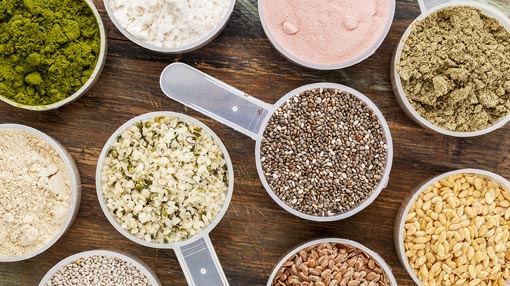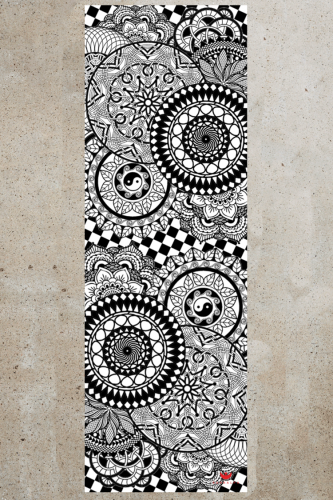Non-Dairy Milk Varieties
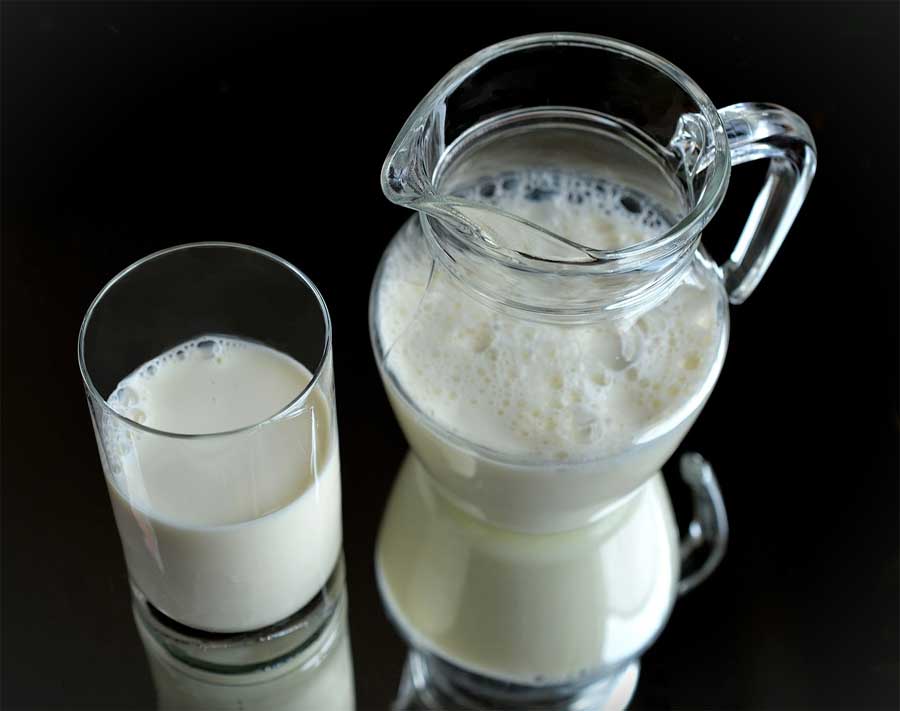
If we are looking for a substitute to replace dairy milk, today more than ever before we have an astounding number of choices. 'Milk' can be made from a number of things ranging from beans to seeds, nuts and grains. Each of these non-dairy choices has different characteristics and different nutritional profiles.
Below are listed various non-diary milk choices and if you are looking for a thorough description of the good and bad qualities of dairy milk you can find that here.
- Milk Made from Beans
- Make Your Own Non-Dairy Milk
- Milk Made from Nuts
- Milk Made from Grains or Seeds
- Non-Dairy Milk Blends
- Summary Chart - Who Wins the Milk Battle


Non-Dairy Milk Made from Beans
Soy Milk
The most common non-dairy milk made from a bean is soy milk and this was the first non-dairy choice I ever tried.
My first encounter with soy milk was the Westsoy Organic Soy Milk unflavored version. It does not taste like milk, but rather has a slightly sweet flavor that evolves into a tart and slightly beany aftertaste. I definitely preferred the flavored versions especially chocolate flavor.
Unfortunately I discovered I am sensitive to soy products and no longer use soy milk. Those who have thyroid or other endocrine issues may find the use of soy products cause negative health effects. Yet many people have no problems with soy milk and find it a suitable replacement for dairy milk.
Of the non-dairy milks, soy has the highest protein. A product like Silk unflavored soy milk has an ingredient list of organic soymilk (filtered water, whole organic soybeans), calcium carbonate, sea salt, natural flavors, carrageenan, vitamin A palmitate, vitamin D2, riboflavin (B2), vitamin B12.
The nutritional profile for regular Soy Milk 8 ounce serving:
- Protein: 7 grams
- Carbohydrate: 4 grams (1 gram sugar, 2 grams fiber)
- Fat: 4 grams
- Vitamins: A, D2, B2, B12
- Color: white
- Texture: smooth
- Thickness: 2 (scale 1 = water, 5 = milkshake)
Interestingly enough, I encountered a 'new' trend in soymilks that have even more protein. The Eden Organic Soy milk has 12 grams of protein, 5 grams of fat, 6 grams of carbohydrate with less than 1 gram of fiber and 2 grams of sugar per 8 ounce serving. The ingredient list is just reverse osmosis purified water and organic soybeans. How do they get nearly twice the protein per serving? Either they are using some higher protein beans or there is some additional soy protein isolate making its way into this soy drink.
Milk Comparison Score : 8/10 Good in flavor and close to comparison in nutrition but for some this is not a good choice due to the potential of thyroid interference.
Other Beans
It is quite possible to make non-dairy milk out of other beans such as adzuki, black, garbanzo, kidney, mung, navy and pinto beans. The method is similar to the way soy milk is made. The main reason that we don't find these other bean milks available is that other beans have less protein than soybeans so it makes economic sense to produce just soy milk on a large scale.
Pinto beans per cup have about 14 grams of protein whereas soybeans per cup have 20 grams of protein. This 30% reduction in protein would mean that a cup of pinto bean milk would have about 4 grams of protein versus the 6 grams of protein found in soy milk. Yet, this is still much more protein than found in other seed and nut milks. From a protein standpoint bean milks make sense. From a convenience standpoint you will not find other bean milks on the shelves. All other bean milks aside from soy would be something we need to make ourselves.
If you are interested in trying out other bean milks and want to find out how to make them, check out this link: Bean Milks

Non-Dairy Milk Made from Nuts
Almond Milk
Almond milk, like this Pacific Foods Organic Original Almond Milk became a staple in my life for a while. I used it in place of milk for a morning cereal I favored that was made of rolled oats, sunflower seeds and date pieces. I consumed this uncooked with just the almond milk to help me consume what was quite frankly an effort in chewing. I really liked the almond milk and as I recall I chose one that was flavored with vanilla as well as sweetened.
Although quite tasty when flavored, the unflavored versions may be a little bland although they do have a slight nutty taste. The ingredient list for the Pacific Foods almond milk is filtered water, organic almond butter, organic rice starch, organic flavor, sea salt, tricalcium phosphate, potassium citrate, carrageenan, soy lecithin, riboflavin (b2), vitamin a palmitate, vitamin d2.
The nutritional profile for regular Almond Milk 8 ounce serving:
- Protein: 1 grams
- Carbohydrate: 2 grams (sugar)
- Fat: 2.5 grams
- Vitamins: A, D2, B2
- Color: off-white
- Texture: smooth
- Thickness: 1 (scale 1 = water, 5 = milkshake)
This extremely low protein profile is one of the problems of almond milk and makes it less desirable a choice in this regard. Yet, the almond milk companies now have a higher protein version. So Delicious Almond Plus has 5 times the protein because they blend their almond milk with pea and rice protein. Better, but 5 grams of protein is still below our standard of 8 grams per cup of milk.
Milk Comparison Score : 3/10 Okay taste but low in nutrition.
Cashew Milk
I had never tried cashew milk before and assumed since it sounded unusual I would have a little trouble finding it, but there it was on the grocery shelf. I chose the unflavored version of SoDelicious Cashew Milk.
After I refrigerated it and shook the carton I poured myself a glass. The color was white and the liquid was smooth and thick. It looked like whole milk in color and texture. The taste was a very milk nutty flavor with perhaps just a hint of sweetness. I did not mind the unflavored taste at all, although it did not taste like milk.
I tried adding a couple of drops of vanilla and stevia along with a drop of honey. This worked very well with the taste. I liked both the unflavored version as well as the flavored that I made and give the cashew milk 7 out of 10 on the taste scale.
The nutritional profile for regular Cashew Milk 8 ounce serving:
- Protein: 0 grams
- Carbohydrate: 1 gram (sugar)
- Fat: 3.5 grams
- Vitamins: A, D2, B2
- Color: off-white
- Texture: smooth
- Thickness: 3 (scale 1 = water, 5 = milkshake)
Nutrition wise, cashew milk is pretty low. Although taste-wise this was good, the zero grams of protein puts this into a fat water category that has no comparison to the 8 grams of protein available in a serving of milk. Yet, if you are looking for a tasty milk replacement you can always boost it with additional protein powder to this to improve its nutritional value.
Milk Comparison Score : 3/10 Very good taste but very poor nutrition.
Coconut Milk
Coconut milk is somewhat new to the market of non-dairy milk, but along with coconut water, it is trending pretty high right now so you will likely be able to find it at many grocery stores.
I went to my local Kroger store and they had about 3 different brands of coconut milk with each brand having several versions of unflavored, vanilla or chocolate. I chose the SoDelicious brand unflavored.
The ingredients listed: Organic coconut milk (organic coconut cream, water, guar gum), calcium phosphate, magnesium phosphate, carrageenan, vitamin A palminate, vitamin D2, L-selenomethionine (selenium), zinc oxide, folic acid, vitamin B12.
I chilled it, shook the carton well which is important with these non-dairy milks, and then poured it into a clear glass to observe it. The color was white and there was no scent which surprised me because I thought I was expecting coconut aroma. On the thickness scale the coconut milk seems like skim milk. It was not smoothly blended and looks a bit like two substances that are not mixed well with a clear fluid and white almost globular spots.
The texture when drinking is very smooth and creamy feeling. The taste is bland and there is absolutely no coconut flavor. Mind you the taste is not bad, but it is not like milk and it is not like coconut. I would rate it about a 5/10 on the taste scale.
I then tried the chocolate version of this coconut milk and that turned out to be a winner in the taste department.
The nutritional profile for unflavored Coconut Milk 8 ounce serving:
- Protein: 0 grams
- Carbohydrate: 0 gram
- Fat: 4.5 grams
- Vitamins: B12, A, D2, folic acid, selenium
- Color: white
- Texture: globular
- Thickness: 2 (scale 1 = water, 5 = milkshake)
Like some of the other non-dairy milks, they do make versions of coconut milk that have added protein. This is also something I would suggest doing if you are going to use this as a milk substitute. Without modification, it is basically just a way to increase fat in the diet.
Milk Comparison Score : 3/10 Okay taste but low in nutrition.

Non-Dairy Milk Made from Grains or Seeds
Rice Milk
Rice milk was another milk that I tried several times when I was drinking almond milk. Rice Dream is probably the most familiar brand. Its ingredients list filtered water, organic brown rice (partially milled), organic expeller pressed canola oil and/or organic safflower oil and/or organic sunflower oil, sea salt.
My initial impression of rice milk is that it was watery and did not look like milk. The taste of the unflavored variety was as I expected, somewhat bland. Overall this choice did not stand out in any way.
The nutritional profile for unflavored Rice Milk 8 ounce serving:
- Protein: 1 grams
- Carbohydrate: 23 grams (10 grams sugar)
- Fat: 2.5 grams
- Vitamins: calcium, iron
- Color: white
- Texture: smooth
- Thickness: 1 (scale 1 = water, 5 = milkshake)
Rice milk has far more carbohydrate than regular milk and any of the other non-dairy milks. Its sugar amount is slightly less than milk. This profile could make a good milk replacement if protein powder were added to boost the protein level.
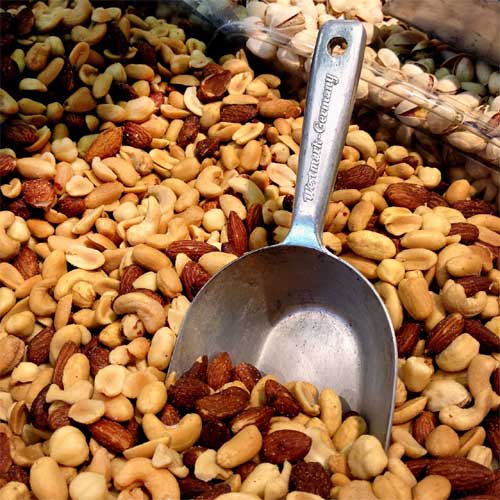
Non-Dairy Milk Blends
These are somewhat new to the market and may be harder to locate in many grocery stores. You can easily find them online. Because they are not as popular yet there are not as many brands to choose from.
Hazelnut/Almond/Cashew Milk Blend
While I was at the store acquiring my cashew milk I felt compelled to give this nut blend a try. The company is Dream Blends.
The ingredient list is filtered water, nuts (almonds, cashews, hazelnuts), inulin, tricalcium phosphate, soy lecithin, carrageenan, gellan gum natural flavors, sea salt, vitamin E (d-alpha tocopheryl acetate) vitamin A palmitate, vitamin D2, vitamin B12.
The nutritional profile for unflavored Hazelnut/Almond/Cashew Milk 8 ounce serving:
- Protein: 1 grams
- Carbohydrate: 5 gram (1 gram sugar, 3 rams fiber)
- Fat: 2.5 grams
- Vitamins: B12, E, D2, A
- Color: white
- Texture: globular
- Thickness: 2 (scale 1 = water, 5 = milkshake)
Here once more we have a low protein drink but at least this one has quite a nice serving of fiber, complements of the inulin, an indigestible fiber from chicory root purported to be a great thing for the intestinal microbes in our digestive tract. If I were looking for a nut based milk replacement, I would consider boosting the protein with protein powder and using this blend.
Milk Comparison Score : 5/10 Although still low in protein it gets extra points for fiber.
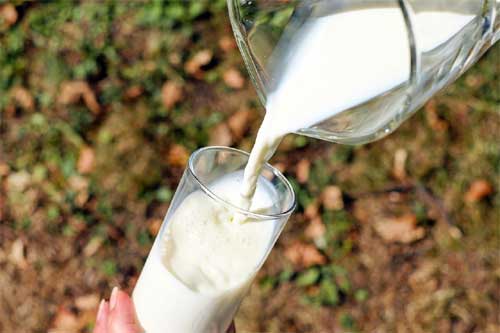
Summary - Who wins the Battle in Non-Dairy Milk
| Type | Milk | Soy | Almond | Cashew | Coconut | Rice | Blend |
| Protein | 8g | 7g | 1g | 0g | 0g | 1g | 1g |
| Carb. | 12g | 4g | 2g | 1g | 0g | 23g | 5g |
| Fat | 0-8g | 4g | 2.5g | 3.5g | 4.5g | 2.5g | 2.5g |
| Vitamins | Calcium, D |
A, D2, B2, B12 |
B2, A, D2 |
B2, A, D2 |
B12, A, D2, folic acid, selenium |
calcium iron |
E, B12, A, D2 |
| Color | white | white | off-white | off-white | white | white | white |
| Texture | smooth | smooth | smooth | smooth | globular | watery | globular |
| Thickness | 2-4 | 2 | 1 | 3 | 2 | 1 | 2 |
| Other | Good protein | High protein | Nutty taste | Very tasty | Bland unless chocolate | Watery but good | Good fiber |
| Score 1-10 | 10 milk is the most like milk... | 8/10 | 3/10 | 3/10 | 3/10 | 3/10 | 5/10 |
Overall, I did not find much value in most of the Non-Dairy Milk substitutes as far as nutrition. Sure, many of them taste great and will do the job of accompanying cereal in that they look somewhat like milk and don't have too much of a different taste. Due to the issue with thyroid disruption and other anti-nutrients contained in soy milk, I cannot give it a solid win in the category either, even though it is closest to the milk nutrient profile.
Yet, aside from soy milk there are none that even begin to compete with what dairy milk has to offer in regards to adding the much needed nutritional component of protein. Without boosting these drinks with added protein then we turn a very low protein meal (cereal with milk) into an even lower protein meal. Granted, most of these are much lower in sugar and fat than dairy milk so that might make them a good choice for those who must watch out for sugar in the diet.
My advice is to continue to use milk if you have no health concerns using it. If you cannot or do not wish to use milk then I would suggest choosing any of the nut milks and adding protein powder to them. Doing this will give you a healthy drink that will be high protein, low sugar and low fat.

Would you like to have a yoga mat that meets your individual needs? The modern world of yoga mats is filled with a multitude of choices. This review will quickly and easily guide you through the important differences...
Do your wrists bother you in some yoga poses? You are not alone. Learn how to avoid this common complaint and how to increase your wrist strength and comfort...
Increasing the protein in your diet can allow you to achieve greater strength gains and enhance your recovery from exercise. Protein powders are a great way to bring in extra protein without a lot of extra calories. Learn the differences between the many types...
Hoodies and yoga go great together...
This little gadget does wonders for the hand...
| Sign up for Jbyrd Yoga News and Events |

Upcoming Seminars
with Julie
Saturday's 1 - 2pm
Free - Deep Breathing Workshop
Register for Zoom Workshop
Live-stream Classes Online
Core Conditioning
Wednesdays 12:30pm
Intermediate Yoga
Thursdays 1pm
Workout With Julie
Friday 11am
All Level Yoga
Saturday 10am
My Instagram

Just got the peppers in their pots.
Latest Articles
- Growing a Container Herb Garden
There is nothing better than fresh herbs from your garden. They are useful for cooking, they smell heavenly and they look so beautiful... Mar 25, 2019
- Getting the Most Out of Fermented Foods
Sometime in the last 150 years we went from a culture that had a rich history of fermenting foods and became a culture that is obsessed with clean, sterile environments... Feb 10, 2019
Great ideas for yoga gifts...
Heart Rate Monitor Review...
Read this review of ergonomic sitting solutions...
Society 6
Jbyrd Yoga Collection
Yoga inspired artwork on tshirts, leggings, tote bags and more...
Organic gardening adventures...
Tales inspired by little furry tails...



